By Claire Bacon, ACN, CNC
We have all learned that the skin is the largest organ in your body. But are you aware of all the important functions it does? The skin regulates body temperature through perspiration. It defends against pathogens. The skin protects underlying tissues and blood vessels from damage. Its melanin shields us from ultraviolet rays. But sometimes, autoimmunity affects normal functions of the skin. Autoimmunity can change how your skin feels (making it dry and itchy). Autoimmunity can change the appearance, too (as in redness, swelling, or patches). Let’s explore the natural strategies that can reduce autoimmunity in the skin…
First, the Immune System Connection
The skin acts as a mediator between the internal “self” and the outside world. It conducts signals that show you what’s going on inside (like bruising). Skin conveys information from the outside (like touching a hot stove). This exchange has physical, chemical, and immunologic components. The main role of the immune system is to cause a defense reaction in the case of danger.
The immune system consists of two parts: the innate side and the adaptive side. The innate side is quick-acting but general. The adaptive side is learned via exposure and memory. These two systems (involving T helper or “Th” cells) work together but take on different roles. Immune responses in the skin involve both the innate and adaptive cellular functions.
In the case of autoimmunity, the balance between these innate and adaptive functions becomes disrupted. One side will eventually become more dominant. As a result, the other side becomes less efficient. Unfortunately, this imbalance causes disease progression and complications.
If there is infection within the skin, immune system cells move to the area. Immune cells release substances that make blood vessels wider and more permeable. This causes the area to swell, heat up and redden. Blood vessels expand with more and more immune cells, until it reaches a certain level of inflammation.
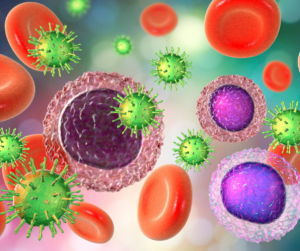
T Helper Cells
In a well-functioning immune system, both groups of T helper cells work together. This keeps the system balanced. One side might temporarily become more active in response to a threat. Relatively quickly, it should settle back to a balanced level. Yes, there are exceptions, but in general:
Typical Cell-Mediated/Innate (Th1) Conditions – pro-inflammatory cytokine responses to pathogens:
- Type I diabetes
- Multiple sclerosis
- Hashimoto’s Thyroiditis
- Grave’s Disease
- Crohn’s Disease
- Psoriasis
- Sjogren’s Syndrome
- Celiac Disease
- Lichen Planus and Sclerosis
- Rheumatoid Arthritis
- Chronic viral infections
Typical Humoral-Mediated/Adaptive (Th2) Conditions – these are typically due to bacteria or ongoing allergies:
- Lupus
- Allergic Dermatitis
- Scleroderma
- Eczema
- Sinusitis
- Inflammatory Bowel Disease
- Asthma
- Allergies
- Cancer
- Ulcerative Colitis
- Multiple chemical sensitivity
It’s good to know if you have an imbalanced immune system. There are certain herbs that can support one kind of T helper response over the other. When you have more information, you can target your supplementation. Your doctor can order a Th1/Th2 cytokine blood panel for you.
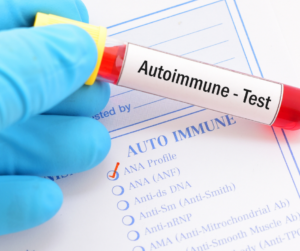
Differences between Psoriasis and Eczema
Psoriasis is an inflammatory skin condition that involves red, scaly patches or skin lesions. This happens due to over-activity of keratinocytes. Psoriasis often has a hereditary component. It often coincides with a Th1 dominant imbalance.
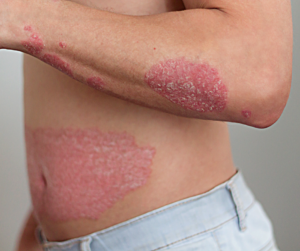
Eczema (aka atopic dermatitis) is a condition that presents as dry, itchy skin. You may notice irritated patches that weep clear fluid when you scratch them. People with eczema may be more prone to bacterial, viral, or fungal infections. It is usually a Th2 dominant imbalance.
Causes of Autoimmunity in the Skin
Many things contribute to an autoimmune condition. Of course, we know that stress can trigger autoimmunity. Nutritional deficiencies or excess yeast can, too. Sometimes, chemical exposure from vaccines or medications, and/or chronic allergies are the cause. Heavy metal exposures from dental work can build up in the body and cause problems. In addition, excess sugar and food sensitivities are huge contributors.
Usually, there are multiple factors at play over a long period of time. With time, these combined factors eventually create a favorable environment for autoimmunity.
Supportive Foods to Reduce Autoimmune Symptoms
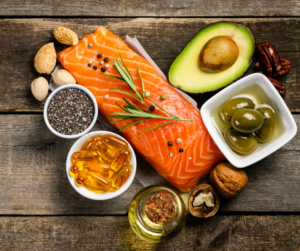
We often say “all autoimmune disease begins in the gut.” Therefore, the top natural strategy is to heal the gut!
We can do this through a system of:
- 1) removing sugar and food sensitivities,
- 2) adding in helpful foods, and
- 3) using targeted supplements.
The primary goal of all of these things is to promote healing of the gut lining. In this way, we can achieve better integrity of gut barrier against inflammatory proteins.
From a dietary perspective, the Autoimmune Protocol (AIP) diet is most appropriate out of any of the therapeutic diets. We recommend that everyone follows the full set of guidelines for at least a month, probably several months until symptoms subside. After that, one should carefully reintroduce foods one-by-one.
I can tell you, if you’re only taking supplements and not being extremely careful with your diet, this strategy will not work. You have to remove the triggers! Don’t expect your supplements to do all the work.
Of course, each individual has unique bio-individuality. This allows different people to tolerate foods without having symptoms. Typically for healing, we want foods high in essential fatty acids and vitamin A. These could include salmon, other fish, and eggs if tolerated. Also, we want to consume carrots, liver, and butter regularly, and more non-dairy probiotic foods. Whereas dairy yogurt is inflammatory, Kombucha tea, coconut kefir, and Kim Chi are more helpful.
Essential Oils As Topical Support
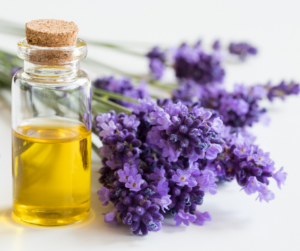
To provide soothing topical relief, we recommend a healing and highly-absorbable carrier oil. You could try Jojoba oil or Coconut oil. You can add to it certain essential oils that are known to be soothing. Proper dilution is important!
Lavender is pretty universal for anything involving the skin, especially burns. And Tea Tree oil helps with many infections and is not irritating. In addition, Calendula oil is great for eczema. Geranium and Black Cumin Seed Oil are both great for psoriasis. If you’re looking for a convenient lotion, Pure Haven Lavender Baby Cream is our favorite. It is also good for burns and diaper rash! Yes, we stock many of these in the office, so just ask!
Supplement Spotlight for Autoimmunity and Skin
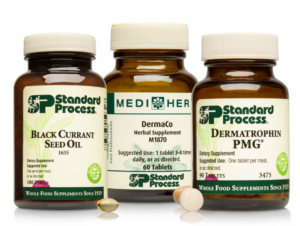
Dermatrophin PMG is a protomorphogen extract derived from healthy skin cells. This supplement acts as a decoy to steer the immune response away from your skin. It’s powerful in promoting normal growth and repair of the skin.
Black Currant Seed Oil contains the fatty acid gamma-linolenic acid (GLA). It is essential as a part of healthy lipid balance. GLA supports the body’s tissue repair function and reduces inflammation. Evening Primrose Oil is a similar source of GLA. It’s very soothing to the skin – whether internal or external!
DermaCo is an herbal blend of Sarsaparilla, Cleavers, Oregon Grape, Burdock, and Yellow Dock. These herbs cleanse the blood and maintain healthy skin. Cleansing the blood of toxins helps promote cellular renewal and integrity.
Final Thoughts on Autoimmunity and Skin
Sometimes, skin issues can be basic garden-variety issues. Simple issues can clear up fairly quickly. However, if you have been struggling with chronic flareups, call your doctor. It’s worth checking out if autoimmunity is involved. If you get an autoimmune diagnosis from your doctor, let us know! We can help you with natural strategies. These can help you feel better over the long term.



